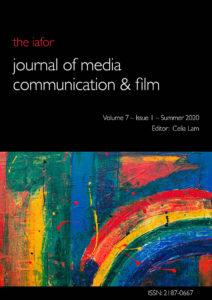The IAFOR Journal of Media, Communication and Film (JMCF) is associated with IAFOR’s MediAsia, FilmAsia and EuroMedia annual conferences. JMCF is committed to publishing peer-reviewed scholarship that explores the relationship between society, film and media – including new and digital media, as well as to giving a voice to scholars whose work explores hitherto unexamined aspects of contemporary media and visual culture.

This seventh issue features contributions from multiple disciplines and nations from around the globe and is the result of an open call for articles. As such, there is no overriding theme. Rather, individual scholars reflect on the function of media texts and the creative industry on social, commercial, and individual levels. We are particularly pleased to support the work of doctoral candidates and early career researchers, who comprise the majority of the authors in this issue.
Article 1
The issue opens with Angelique Nairn and Justin Matthews’ reflection on the identity of the creative worker in the documentary “Drama at Disney: A Thematic Analysis of Creative Worker Identity Negotiation and Identification in the Documentary Waking Sleeping Beauty”. Exploring the types of worker identities expressed in the film, Nairn and Matthews argue that creatives negotiate their identities in response to external pressures from their employers and during changes in management styles; balancing both intrinsic motivations and extrinsic employment conditions.
https://doi.org/10.22492/ijmcf.7.1.01
Article 2
The following two articles examine art forms in the Indian context for their ability to comment on contemporary Indian social issues. In “Humour and the Margins: Stand-Up Comedy and Caste in India”, Madhavi Shivaprasad examines the personas of high-profile stand-up comedians in India and highlights how, despite indications of awareness of the issues of privilege and discrimination associated with caste, the comedians nonetheless reinforce rather than challenge existing caste systems.
https://doi.org/10.22492/ijmcf.7.1.02
Article 3
Questioning dominant social norms is also the focus of Sumati’s article, “Selected Bollywood Films as Sites of LGBTQ Contestation, Assertion and Cultural Disruption”, an exploration of a number of Bollywood films that Sumati argues, reflect the shifting discourse and broader acceptance of LGBTQ identities in Indian society.
https://doi.org/10.22492/ijmcf.7.1.03
Article 4
Finally, Puntarika Rawikul and Wichian Lattipongpun in their article, “Promoting Gender Reassignment Surgical Service in Thailand among International Transgenders” explore the motivation for transgender persons to seek gender reassignment. They highlight a number of factors influencing decisions to undergo surgery ranging from economic to socio-cultural and local advertising regulations.
https://doi.org/10.22492/ijmcf.7.1.04
The JMCF Editorial Board owes a debt of gratitude to our external peer reviewers, notably Dr Weranuj Ariyasriwatana (Marist College in New York State), Dr Jerimiah Morris (Mahidol University International College), Dr Zoran Lee Pecic (Roskilde University), and Professor Padma Rani (Manipal Institute of Communication, Manipal). We would also like to extend our sincere thanks to the IAFOR Publications Desk, our authors and dedicated readership.
Dr Celia Lam
Editor, IAFOR Journal of Media, Communication & Film

